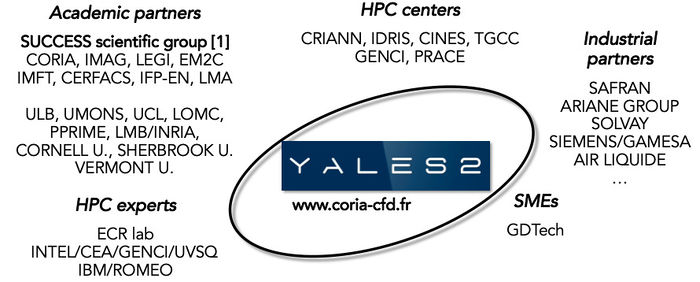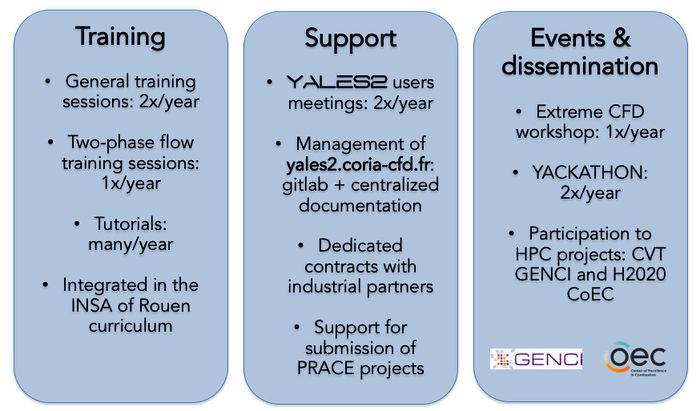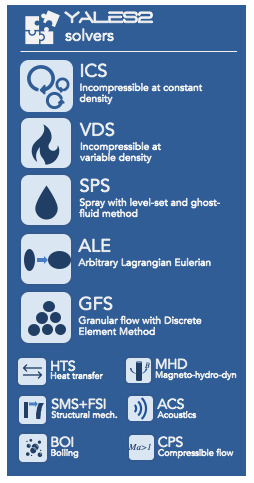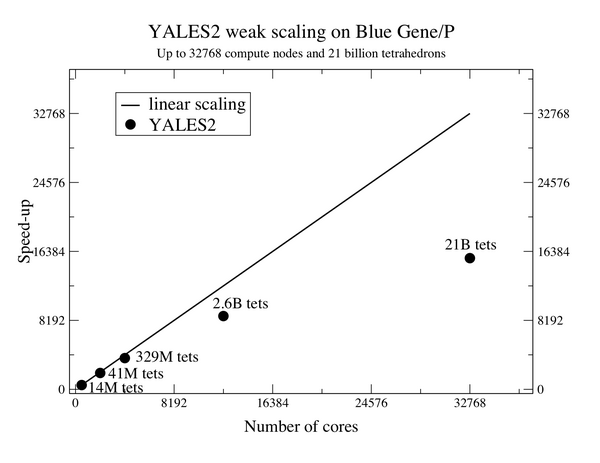YALES2 public page
(→Open Positions) |
|||
| Line 14: | Line 14: | ||
More information may be found in the following presentation: [[media:yales2_course.pdf | YALES2 presentation]] | More information may be found in the following presentation: [[media:yales2_course.pdf | YALES2 presentation]] | ||
| − | == | + | == Community == |
| − | + | There is today more than 500 researchers/engineers who were trained by the CORIA since 2009. The community regroup academic partners, HPC centers, industrial partners, HPC expert, SMEs and more. | |
| − | + | [[File:Network.jpg | center | thumb | 700px | YALES2 network]] | |
| − | + | == Commitments == | |
| − | + | The YALES2 team is committed to supporting code users through training, meetings, projects or events. | |
| − | + | [[File:Commitment.jpg | center | thumb | 700px | YALES2 team commitment]] | |
| − | + | Here an example of event you can participate to: | |
| − | + | ||
| − | + | ||
| − | + | ||
| − | + | ||
| − | + | ||
| − | + | ||
| − | + | ||
| − | + | ||
| − | + | ||
| − | + | ||
| − | + | ||
| − | + | ||
| − | + | ||
| − | + | ||
| − | + | [[File:Extreme CFD.jpg | center | thumb | 700px | Extreme CFD event, https://ecfd.coria-cfd.fr/index.php/Ecfd:ecfd_4th_edition]] | |
| − | + | ||
| − | + | ||
| − | + | ||
| − | + | ||
| − | + | ||
| − | + | ||
| − | + | ||
| − | + | ||
| − | + | ||
| − | + | ||
| − | + | ||
| − | + | ||
| − | + | ||
| − | + | ||
| − | + | ||
| − | + | ||
| − | == | + | == YALES2 Library and solvers == |
| − | + | ||
| − | + | ||
| − | + | ||
| − | + | ||
| − | + | ||
| − | + | ||
| − | + | ||
| − | + | ||
| − | + | ||
| − | + | ||
| − | + | ||
| − | + | The numerical library YALES2LIB consists of all the numerical methods required to develop solvers: | |
| − | + | ||
| − | + | ||
| − | + | ||
| − | + | ||
| − | + | ||
| − | + | ||
| − | + | ||
| − | + | ||
| − | + | ||
| − | + | ||
| − | + | ||
| − | + | ||
| − | + | ||
| − | + | [[File:Library.jpg | center | thumb | 800px | YALES2 library]] | |
| − | + | ||
| − | + | We have plenty of solvers today, here are the principals: | |
| − | + | ||
| − | + | [[File:Solvers.jpg | center | thumb | 700px | YALES2 solvers]] | |
| − | + | ||
| − | + | These solvers use plenty of numeric methods and data structures: | |
| − | + | ||
| − | + | [[File:DataNum.jpg | center | thumb | 700px | Numeric methods and data structures]] | |
| − | + | ||
== Gallery == | == Gallery == | ||
| − | Some computation examples are given in the [[YALES2_Gallery|gallery]]. | + | Some computation examples are given in the [[YALES2_Gallery|gallery]] and on the Youtube video channel [https://www.youtube.com/@CoriaCFD] |
== Performances == | == Performances == | ||
Revision as of 21:03, 20 July 2023
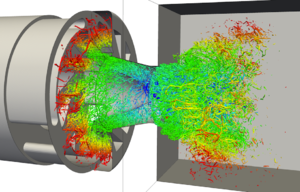
Contents
Motivation
YALES2 aims at the solving of two-phase combustion from primary atomization to pollutant prediction on massive complex meshes. It is able to handle efficiently unstructured meshes with several billions of elements, thus enabling the Direct Numerical Simulation of laboratory and semi-industrial configurations.
YALES2 was developed from 2007 to 2010 by V. Moureau and is maintained since 2011 by V. Moureau and G. Lartigue at CORIA and several other people in research laboratories.
More information may be found in the following presentation: YALES2 presentation
Community
There is today more than 500 researchers/engineers who were trained by the CORIA since 2009. The community regroup academic partners, HPC centers, industrial partners, HPC expert, SMEs and more.
Commitments
The YALES2 team is committed to supporting code users through training, meetings, projects or events.
Here an example of event you can participate to:
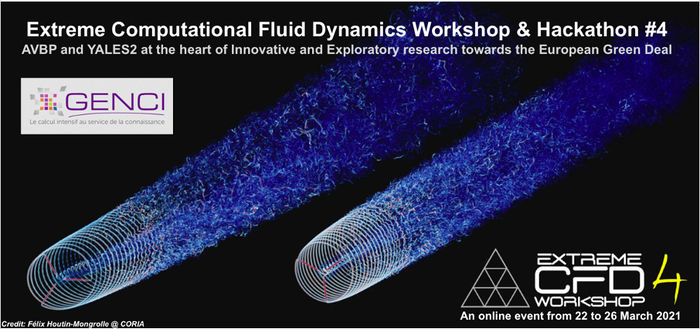
YALES2 Library and solvers
The numerical library YALES2LIB consists of all the numerical methods required to develop solvers:
We have plenty of solvers today, here are the principals:
These solvers use plenty of numeric methods and data structures:
Gallery
Some computation examples are given in the gallery and on the Youtube video channel [1]
Performances
Thanks to highly efficient linear solvers, the speed-up of YALES2 is almost linear for meshes with several billion elements. These measures up to 21 billion elements were performed at IDRIS in France and at the Juelich Supercomputing Center in Germany.
